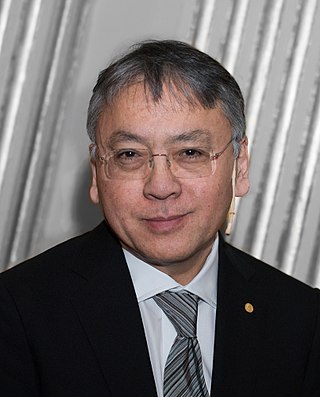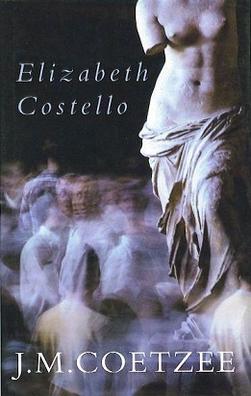
Sir Ahmed Salman Rushdie is an Indian-born British-American novelist. His work often combines magic realism with historical fiction and primarily deals with connections, disruptions, and migrations between Eastern and Western civilizations, typically set on the Indian subcontinent. Rushdie's second novel, Midnight's Children (1981), won the Booker Prize in 1981 and was deemed to be "the best novel of all winners" on two occasions, marking the 25th and the 40th anniversary of the prize.

Sir Kazuo Ishiguro is a Japanese-British novelist, screenwriter, musician, and short-story writer. He is one of the most critically acclaimed contemporary fiction authors writing in English, having been awarded the 2017 Nobel Prize in Literature. In its citation, the Swedish Academy described Ishiguro as a writer "who, in novels of great emotional force, has uncovered the abyss beneath our illusory sense of connection with the world".
This article contains information about the literary events and publications of 2001.
The play – for which Briony had designed the posters, programs and tickets, constructed the sales booth out of a folding screen tipped on its side, and lined the collection box in red crepe paper – was written by her in a two-day tempest of composition, causing her to miss breakfast and lunch.
This article contains information about the literary events and publications of 1988.
This article contains information about the literary events and publications of 1981.

Postmodern literature is a form of literature that is characterized by the use of metafiction, unreliable narration, self-reflexivity, intertextuality, and which often thematizes both historical and political issues. This style of experimental literature emerged strongly in the United States in the 1960s through the writings of authors such as Kurt Vonnegut, Thomas Pynchon, William Gaddis, Philip K. Dick, Kathy Acker, and John Barth. Postmodernists often challenge authorities, which has been seen as a symptom of the fact that this style of literature first emerged in the context of political tendencies in the 1960s. This inspiration is, among other things, seen through how postmodern literature is highly self-reflexive about the political issues it speaks to.
Hysterical realism is a term coined in 2000 by English critic James Wood to describe what he sees as a literary genre typified by a strong contrast between elaborately absurd prose, plotting, or characterization, on the one hand, and careful, detailed investigations of real, specific social phenomena on the other. It is also known as recherché postmodernism.

Duende or tener duende is a Spanish term for a heightened state of emotion, expression and authenticity, often connected with flamenco. Originating from folkloric Andalusian vocal music and first theorized and enhanced by Andalusian poet Federico García Lorca, the term derives from "dueño de casa", which similarly inspired the duende of folklore.

Elizabeth Costello is a 2003 novel by South African-born Nobel Laureate J. M. Coetzee.
The prominent Athenian statesman Alcibiades has been criticized by ancient comic writers and appears in several Socratic dialogues. He enjoys an important afterlife, in literature and art, having acquired symbolic status as the personification of ambition and sexual profligacy. He also appears in several significant works of modern literature.
Giannina Braschi is a Puerto Rican poet, novelist, dramatist, and scholar. Her notable works include Empire of Dreams (1988), Yo-Yo Boing! (1998) and United States of Banana (2011).

A duende is a humanoid figure of folklore, with variations from Iberian, Ibero American, and Latin American cultures, comparable to dwarves, gnomes, or leprechauns. In Spanish duende originated as a contraction of the phrase dueñ(o) de casa, effectively "master of the house", or perhaps derived from some similar mythical being of the Visigoth or Swabian culture given its comparable looks with the “Tomte” of the Swedish language conceptualized as a mischievous spirit inhabiting a dwelling.

The Satanic Verses controversy, also known as the Rushdie Affair, was a controversy sparked by the 1988 publication of Salman Rushdie's novel The Satanic Verses. It centered on the novel's references to the Satanic Verses, and came to include a larger debate about censorship and religious violence. It included numerous killings, attempted killings, and bombings by perpetrators who supported Islam.

In mid-June 2007, Salman Rushdie, the British-Indian novelist and author of the novel The Satanic Verses, was created a Knight Bachelor by Queen Elizabeth II. Soon after the news of the knighthood was released protests against the honour were held in Malaysia and in Pakistan where effigies of the writer were publicly burnt. On 19 June 2007, governments in both Pakistan and Iran summoned their British ambassadors to officially protest against the award. While many groups and individuals have renewed the call to execute Rushdie, the author "is not commenting on the latest threats to his life. It is understood he is anxious not to inflame the situation". When asked by the Associated Press if his silence was at the request of the British government, Rushdie replied by e-mail stating "The British authorities have not asked me to do or not do anything. I have simply chosen to remain out of this storm for the moment. And nobody is turning anything down." The media noted in July 2007 that Rushdie "has not been seen in public since the 16 June announcement of his knighthood." However, he was photographed receiving his knighthood formally the next year at a ceremony which, breaking with tradition, was not announced in advance of his attendance.

Abdulrazak Gurnah is a Tanzanian-born British novelist and academic. He was born in the Sultanate of Zanzibar and moved to the United Kingdom in the 1960s as a refugee during the Zanzibar Revolution. His novels include Paradise (1994), which was shortlisted for both the Booker and the Whitbread Prize; By the Sea (2001), which was longlisted for the Booker and shortlisted for the Los Angeles Times Book Prize; and Desertion (2005), shortlisted for the Commonwealth Writers' Prize.
The Prix du Meilleur Livre Étranger is a French literary prize created in 1948. It is awarded yearly in two categories: Novel and Essay for books translated into French.

United States of Banana (2011) is a postmodern allegorical novel by the Puerto Rican author Giannina Braschi. It is a cross-genre work that blends experimental theatre, prose poetry, short story, and political philosophy with a manifesto on democracy and American life in a post-9/11 world. The book dramatizes the global war on terror and narrates the author's displacement after the attacks from her home in the Battery Park neighborhood in New York City. The work addresses Latin American immigration to the United States, Puerto Rico's colonial status, and "power imbalances within the Americas."
Empire of Dreams is a postmodern poetry epic by Puerto Rican author Giannina Braschi, who is considered "one of the most revolutionary voices in Latin American literature today".
Ankhi Mukherjee is an academic specialising in Victorian and Modern English literature, critical theory and postcolonial and world literature. In 2015, she was appointed a Professor of English and World Literatures by the University of Oxford.









